FRESH STREET #5 - Conference highlights!
Circostrada’s flagship conference FRESH STREET was hosted for the first time in the UK this year, as part of the Out There International Festival of Outdoor Arts and Circus. It took place Wednesday 28 to Friday 30 May 2025, at the Hippodrome in Great Yarmouth. FRESH STREET is the world’s foremost conference for the outdoor arts and contemporary circus sector. FRESH #5 brought together key European and international artists, programmers, and policymakers for three days of dynamic discussions and stimulating exchanges on how we could imagine the outdoor arts of tomorrow.
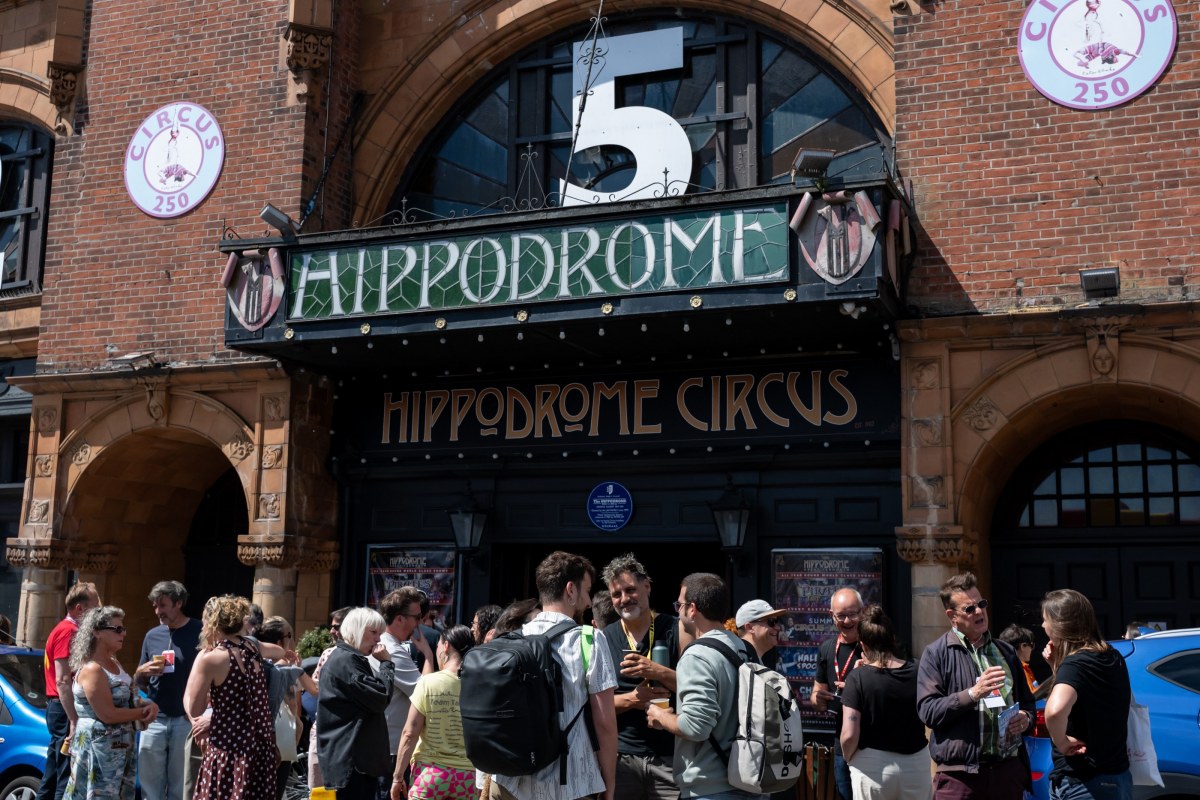
As the conference starts on Wednesday morning, the Hippodrome is packed out with close to 400 delegates from five continents – most of Europe represented, alongside visitors from the Americas, Asia, Africa, and Australia. The conference delegates are welcomed to the Hippodrome by Jack Jay, son of Peter Jay who bought the building in 1979. Peter Jay presented his first show in 1981, and the Jay family continue to produce circus spectaculars here four times a year. Jack told us that the Hippodrome is the oldest surviving dedicated circus building in the UK. It is a truly extraordinary building– created in 1903 by showman George Gilbert and architect Ralph Scott Cockrill in an ornate art nouveau style. It is a perfect venue for circus, being in the round with a great height for aerial work. Keynote speakers on day one were: Alice Brunot, ARTCENA/Circostrada; Darren Henley, Arts Council England; and Joe Mackintosh, artistic director of Out There Festival, and the Out There Arts team, who introduced the festival’s key concepts for the next three days – placemaking, inclusion, and the future.
Day 1 – Wednesday 28 May 2025
Keynote Speakers: Alice Brunot, Darren Henley, Joe Mackintosh and team
Alice Brunot welcomed everyone to the fifth FRESH STREET conference. She reminded us that it was at a previous Annual General Meeting of the Circostrada Network, coorganised by Circostrada and XTRAX in 2016, that news broke of Britain’s decision to leave the EU. There has been much to negotiate and manage over recent years, but the Outdoor Arts sector is strong and resilient. She reminded us that FRESH is a space for dialogue and to foster new or renewed connections. She also stressed our shared belief in the power of the arts to transform lives. She reiterated the FRESH values: spontaneity, human-centred, respectful and with environmental awareness.
Darren Henley, chief executive officer of Arts Council England described the work of ACE as a national development agency for arts and culture which exists to develop and support England’s creative sector. He told us that he thought Great Yarmouth was a brilliant choice for this conference, with its vision (through the work of Out There Arts and partners) to become a National Centre for Circus and Outdoor Arts. Darren highlighted the importance of placemaking (one of the key concepts to be explored in this conference). He stressed the ACE commitment, through the Let’s Create initiative, that everyone should have the opportunity to experience culture, quoting George Orwell’s definition of freedom as being ‘the ability of people to choose their own amusements rather than have them chosen from above’. Darren said that the Outdoor Art sector was uniquely placed to deliver work that centred co-creation and collaboration. He said that Great Yarmouth was one of 54 priority places in the UK earmarked for ACE support. He flagged up the work of Creative People and Places (CPP) which in Yarmouth manifests through the work of Freshly Greated, in partnership with Out There Arts. Darren ended by saying we should remain open to the world and embrace collaboration. Joe Mackintosh told the conference that Great Yarmouth has a rich history, and many heritage buildings, mostly connected to seafaring, naval endeavours, and fishing – but much of that traditional industry has fallen away. It’s seen as one of the more deprived areas of the UK, so having a major Outdoor Arts festival here is a major boost for the town… Joe described his arrival as a young producer, in the 1990s, to this small and rather rundown town on the far eastern edge of England, on the North Sea coast. He’d noted that other than the Hippodrome, Yarmouth was something of a ‘cultural desert’. He became director of Out There Arts (then called Sea Change Arts) in 2004, building up the organisation into a ‘multi-purpose cultural hub’; and working with the local community (many of whom were Portuguese speaking immigrants working in the food industries). In 2008 there were two landmark events: the purchase of the Drill House, which remains the organisation’s centre of activities to this day; and the first ever Out There Festival – made possible with the acquisition of European funding. Now, there is another major landmark with the opening of Out There Arts’ new venue, the Ice House, which will be a hub for circus and outdoor arts creation.
Joe then invited Out There Arts executive director Veronica Stephens to speak. Veronica told the conference that she had grown up in a small town in the Midlands, and had learnt early in life the value of ‘thinking big in a small town’. Working with Zap Arts in Brighton, she had been a key member of the team that made Outdoor Arts a vital part of the Brighton International Festival – programming major works by the likes of Generik Vapeur, who she later brought to Out There Festival. She stressed the importance of partnerships (e.g. with Interreg EU and with the Catalan and Finnish Institutes), and risktaking, saying ‘thinking big and bold is key to unlocking support’. Her ambition became for Out There Festival to make everybody in the town visible; helping to generate a sense of vibrancy and positive energy, and making Yarmouth a great place to live and work. We also heard from Out There employees Emily Phillips (producer) and Marcin Rodwell (communications manager) – young people who were raised in Yarmouth and have grown their skills as arts managers and producers working within the Out There Arts organisation.
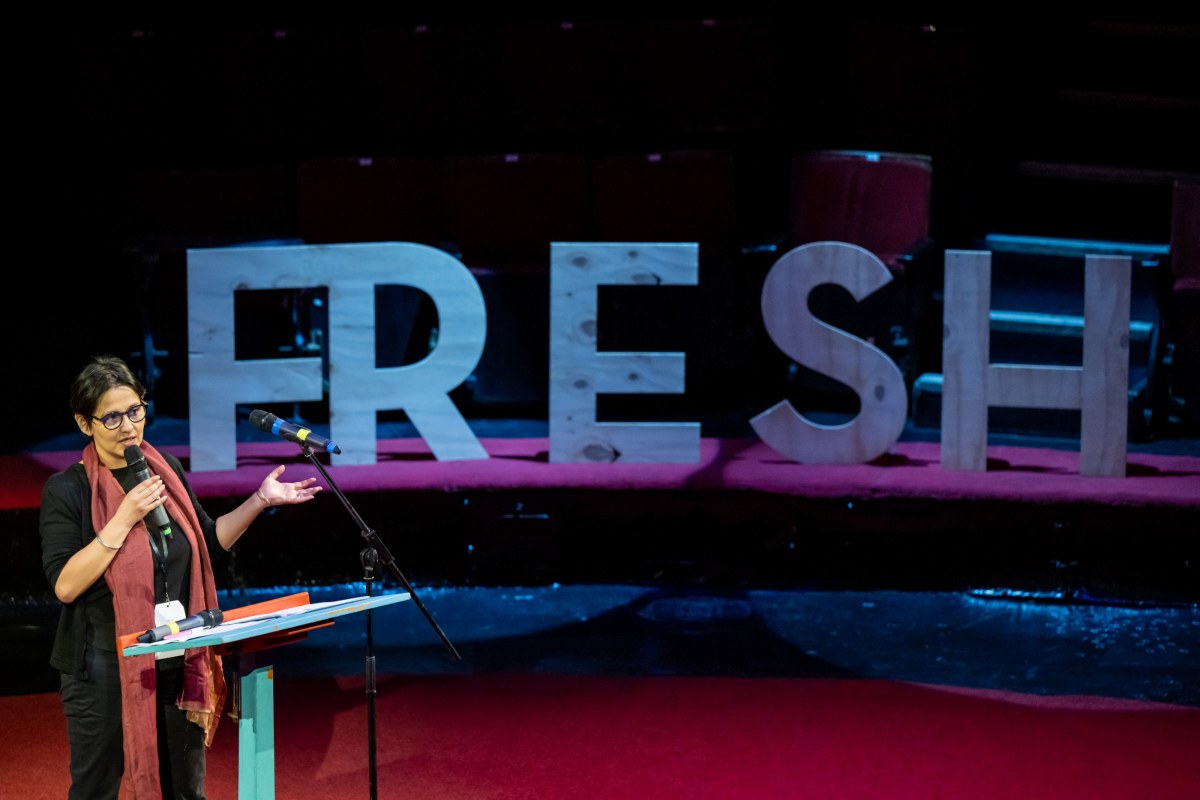
Panel discussion – Day 1
Following the keynotes and coffee, the rest of the morning was taken up with a panel discussion entitled Revolution, Gentrification or Entertainment? Some of the key questions asked were: are popular entertainment and political art incompatible with each other? Can we be revolutionaries and pay the rent? The panel was facilitated by Alexis Nys, director of Lieux Publics (France), and the panellists were: Do Verschragen and Chiva Bons, co-founders of Circusbende (Netherlands); Alba Colombo Vilarrasa, associate professor, Universitat Oberta de Catalunya (Spain); Paka Johnson, artist, Paka the Uncredible (UK); Eddie Egal, artist and pyromancer (Germany); and Smriti Rajgarhia, director of Serendipity Arts Foundation and Festival (India).
Key points emerging from the panel presentations: Do Verschragen and Chiva Bons charted their artistic journey from an underground lifestyle, creating circus in alternative spaces, to running an established festival, saying ‘profit versus humanity is a reality we have to deal with… now we are institutional, running festivals, residencies and social projects’. Alba Colombo Vilarrasa talked of being a ‘strange fish in a wonderful ocean’, an academic specialising in the sociology of culture, but also someone who worked at festivals. She asked: What is revolution? Answering: radical change made by a collective. Growth versus de-growth? Alba cited the Barcelona experience – positive after the Olympics but saying ‘we have lost something’ and mooting a slowed-down approach. Smriti Rajgarhia gave an Indian perspective, saying hers was ‘a very different context’ – India was very large and very diverse, and already with a multitude of festivals. Her company/festival Serendipity relied almost entirely on private sponsorship. It takes place in a small town, and there were issues with drawing people in to the cultural centres, with Smriti reassessing what ‘access’ means and what it takes to cross thresholds. She spoke of her experience as ‘positive gentrification’.
Paka Johnson and Eddie Egal brought a different perspective; telling a story of living in squats and creating large-scale sculptures, automata, and pyro in alternative spaces and at music festivals. ‘We come from the street’ they say. On gentrification, they didn’t mince their words, referring to ‘Arseholes coming in and buying up our lives’ (Eddie). ‘When the trendies come in, it’s time to move on’ said Paka. Re: funding and official approval, Paka said: ‘Buy the dream, don’t worry about the money’.
In the general discussion that followed, some of the points that emerged were:
• Things start clandestine, then end up in galleries
• Gentrification forces artists out
• When you get evicted you develop a revolutionary spirit
• To put on a festival you need to have a revolutionary spirit
• Let’s rethink what we mean by revolutionary
• Revolution has a lot to do with freedom
• The world is defined by money
• Take the space, make the work – the spirit will never die
• Take the space – but don’t waste it
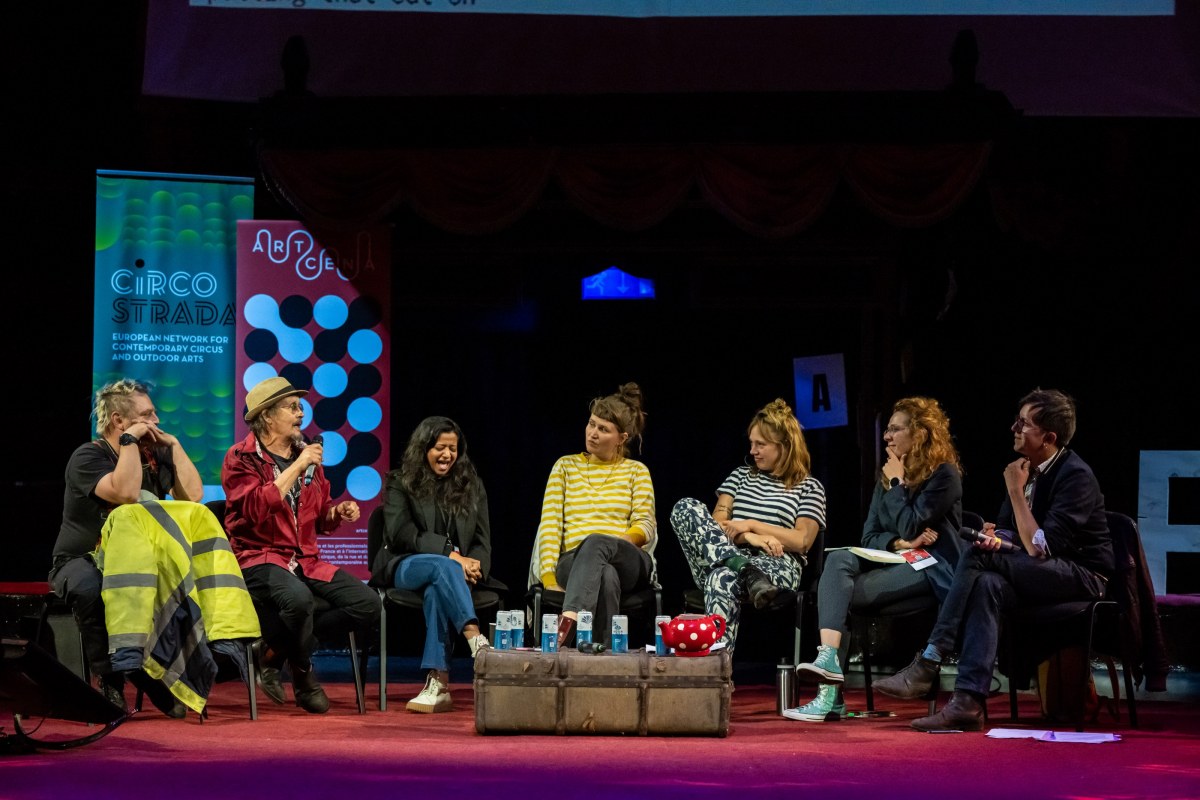
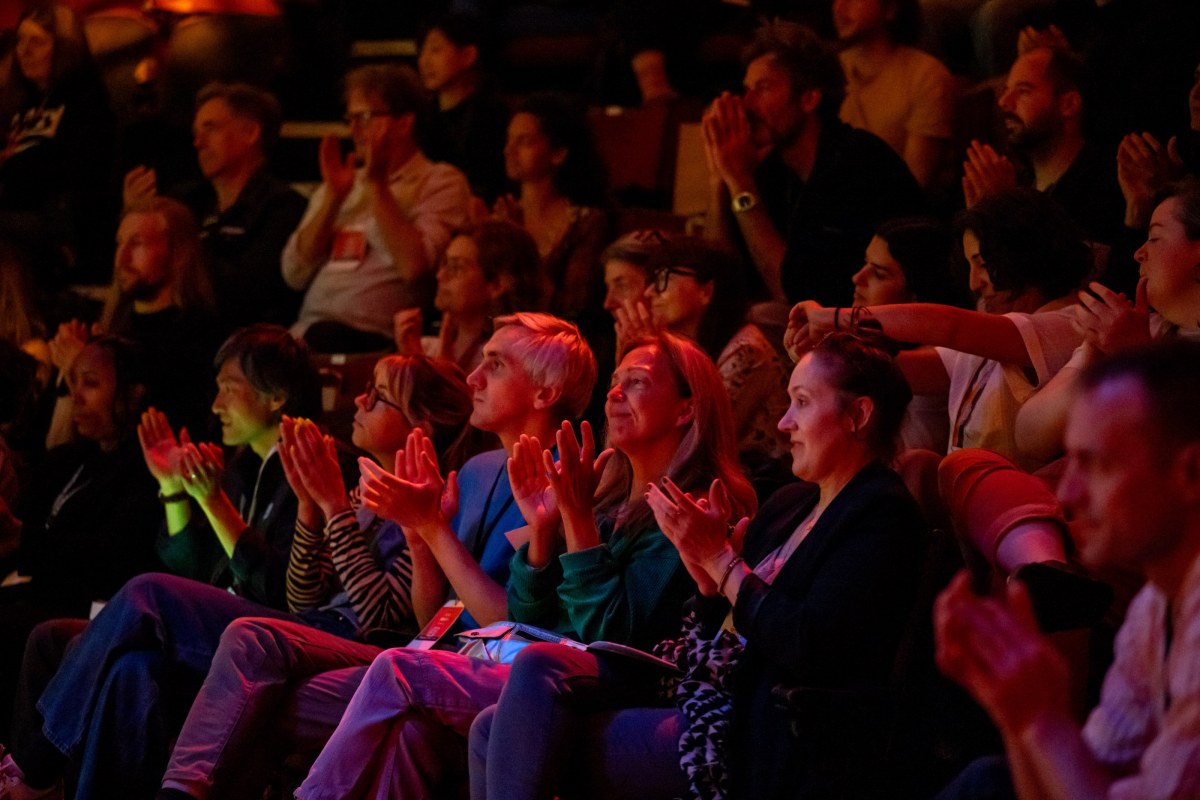
Day 2 – Thursday 29 May
Keynote Speaker Vicki Dela Amedume
On the second day of the conference, the theme was Creating with Communities. The keynote speech was given by Vicki Dela Amedume, director of Upswing, who has has been performing and creating aerial and circus-based work in the UK and worldwide since 1997. Vicki Dela works widely to aid the development of both established and emerging artists, with projects like the Flex Lab residency and the award-winning short film Circus Flavours On Screen. Upswing is now based in Stoke-on-Trent. Vicki Dela told us a little of her background as a Ghanian refugee who came to London with her family in the 1980s. She spoke of the inter-racial tensions of the time, but also of collaborations and friendships. She created Upswing to be a ‘home for other circus artists from the global majority’ and referenced the Arts Council England Let’s Create initiative, which moved the intention on from ‘great art for everyone’ to everyone having the opportunity to make, as well as to see, great art. She spoke of her interest in how art can live beyond the stage, and how the company’s move from London to Stoke helped, as Stoke Appetite has been such a crucial initiative for circus and outdoor arts. She talked of her desire, as an artist, to make work ‘that doesn’t exist in a vacuum’ and said that the work wasn’t just about putting on shows, but in really listening to the community. As a producer, her job was to be a bridge between the artist and the community / the place in which the work will take place – to build bridges. Following her keynote address, Vicki Dela was interviewed by Sho Shibata, director of Outdoor Arts UK.
Key points:
On the use of funders’ language and jargon: Vicki stressed the need when working within the community to abandon the art jargon and use plain language, otherwise people will switch off. She stressed the importance of in-person, live contact when building community / cocreating. Cho summed up her approach as ‘tuning in and building bridges’. Asked about working with international communities, Vicki said she had a ‘natural alignment’ with working-class communities everywhere. Resilience and connection were two key words flagged up by Vicki.
Panel Discussion – Day Two
Following a coffee break, giving delegates a chance to network and to explore the backstage museum at the Hippodrome, the conference reconvened for the panel discussion. The questions addressed included: what does ‘community-led’ and ‘community co-created’ mean? How do we generate lasting change in and with communities? How do we foster more space for diversity? Also, what can other countries learn from the UK in community focused arts? The panel discussion was facilitated by Sho Shibata, director of Outdoor Arts UK (UK). Panellists were: Luis Petit & Gary Shochat of Kamchàtka (Spain); Luke Horley of Collectif Malunés (UK/ Belgium/France); Jacqui Mackay, programme director of Freshly Greated (UK); Tatiana-Mosio Bongonga & Jan Naets, directors of Cie Basinga (France); Antonia Kuzmanić, director of ROOM 100 and Peculiar Festival (Croatia); and Alicia Laguna, coartistic director of Teatro Línea de Sombra and curator of Transversales (Mexico).
Key points from the panel presentations:
Catalan artists Luis Petit & Gary Shochat described Kamatchka’s starting point as a desire to create site-specific work in public space. Their latest work Fugit involved intense work in many neighbourhoods with different communities. They spoke of the value of placemaking and ‘creating shared memories’. Their key approach was: 1) immersion: meet people, walk around, be open, listen. 2) call for participations but be aware of the ‘usual suspects’ who sign up for everything in their community. Go to local groups to seek out people who wouldn’t normally sign up. People are not ‘objects to use in your show’ – and spoke of ‘leaving a trace’ after the work has finished. UK artist Luke Horley spoke of his work in Britain and Europe as part of Collectif Malunés, a circus collective that brought together circus and live music. As a collective of 7 artists, collaboration is core to their work processes. Jacqui Mackay said that Freshly Greated was one of 39 Creative People and Places (CPP) initiatives in the UK, which take place in towns with a low level of engagement in artistic practice. Working with Out There Arts, they have created a rich number of events and opportunities. She talked of ‘responding to the needs of a hyper-local community’ and said that participants had said that Freshly Greated was better for their mental health than a visit to the doctor. Tatiana-Mosio Bongonga & Jan Naets spoke of taking tight-wire workshops into the community – setting up and staying for two-week residencies, running workshops daily in wire-walking, music and costume design; and encouraging a ‘have a go’ attitude. They spoke of unplanned outcomes, such as neighbours who hadn’t previously spoken to each other setting up community gardens. Antonia Kuzmanić spoke of her work in Croatia linking contemporary circus artists who wanted to work in public space with private companies. She also spoke of a personal project working in the salt marshes, a traditional industry in Croatia, raising the question of whether it was fair to these communities to ‘use them in our research’. She stressed the value of stepping out of one’s comfort zone and taking risks. Alicia Laguna spoke of three aspects of her work on the US/Mexican border: 1) research 2) creating the Festival Traversales 3) her 13-year-old immigrant project, focusing on work in shelters with migrants from further south (e.g. Guatemala) who had travelled through Mexico en route to the USA, often on the top of cargo trains.
In the general discussion that followed, some of the points that emerged were:
• Working with communities is a long-term process
• Learn to listen
• There’s a balance to be made between touring work and community work
• Work on your methodology
• Learn and share your practice
• Collaboration takes many forms: it doesn’t have to be performing; it could be giving access to an electrical supply, or coming to see the show
• Trust the process
• Be a witness: we are here; we are together
• We are not reflecting society; we are part of society
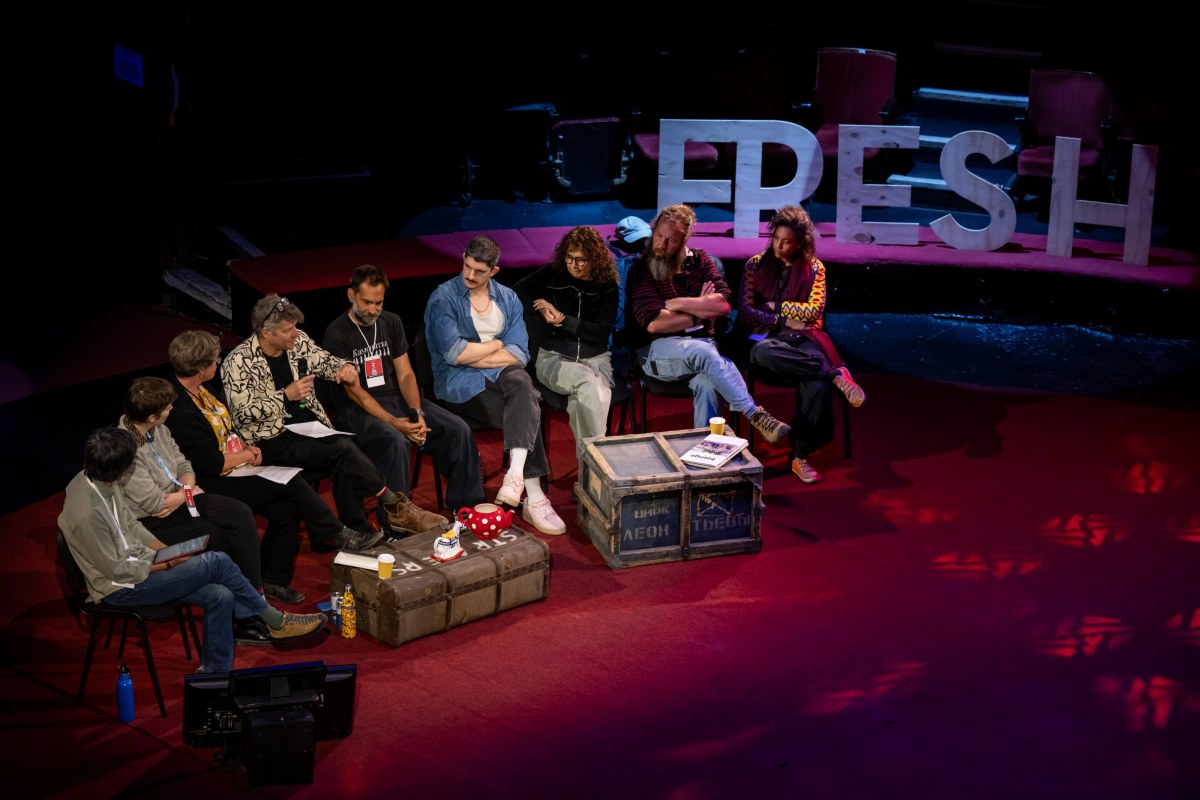
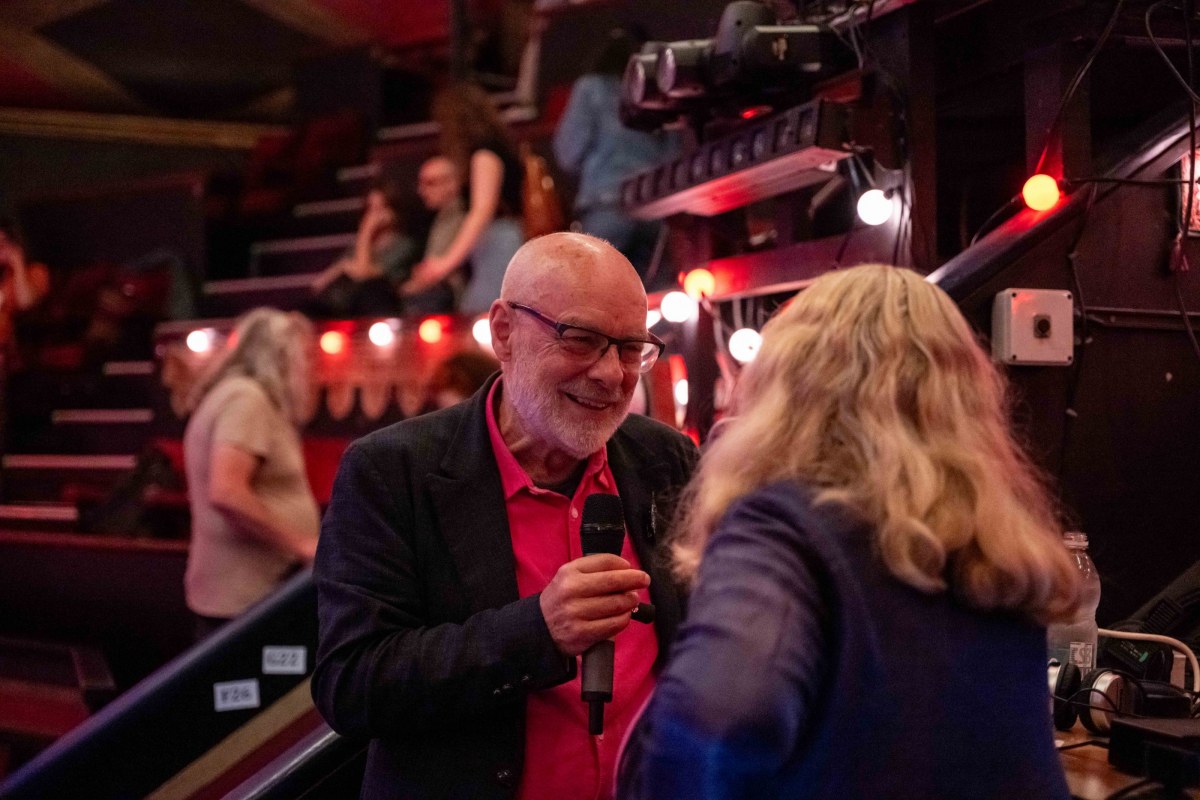
Day 3 – Friday 30 May
Keynote Speaker Brian Eno
Day 3 saw the focus shift to The Future – with the provocation: When everything’s a mess, what use are artists? What is the purpose of art and artists in the face of the future we are looking at? How do we find meaning and value in what we do? The planet is on fire, and human life on earth heads towards extinction. Economic prospects are dire, and austerity continues to bite. War and terror flood our screens daily and fascist sentiment grows across Europe. When everything is falling apart, would you call in the artists? The keynote speaker for the day was Brian Eno: musician, producer, visual artist, and activist. As a solo musician he has made very many seminal albums, and is credited as the instigator of the ambient music movement. He is also a renowned musical collaborator. Eno’s visual art has been showcased worldwide, and his recent activism work has seen him co-founding EarthPercent and the Hard Art Collective. Brian Eno started by saying that we are in a mess – the earth is on fire and we clearly need scientists, firemen, humanitarian organisations, wise politicians. But do we need artists? Unsurprisingly, Eno thinks we do, saying ‘artists don’t just respond to change they create it.’ He spoke of the Hard Art Collective, which comprises artist, scientists, and activists.When at art school, age 17, he was a challenged by a girlfriend’s mother, who asked why someone with a mind as good as his would want to be an artist, which kicked off a thought process that continues to this day about the value of art. An artist is alive to things, he says. The artist continues to play throughout adult life; play being how we learn about the world. He cites examples of popular culture – the Beatles haircuts, Doc Martens boots – as ‘artworks’ and says that it is all art; all part of the culture. Paintings, books, films, music, earrings, shoes – it is all art. We all ‘do art’; make aesthetic decisions about our hair and clothes. There is no strict borderline between professional artists and others – playfulness is key.
Art is a way to make feelings happen. It shows us other worlds and possibilities, and helps us to process how we feel about the world. Art produces social synchronisation; helps us find a place of consensus. Art says: this is the world we are in, and these are some of the worlds we could end up in. Art is about cultivating the soil of culture. Art won’t solve the climate crisis: art can’t put our fires. But art can start them. We need art to enable us to feel: to process our feelings about the world, and help us act on them.
Panel Discussion
After the coffee break, a panel of artists and cultural professionals took to the stage to unpack how artists are responding to today’s and the future’s global and economic challenges. How do creativity and resilience shape artistic practice in uncertain times? The panel discussed these issues, and the reclaiming of public space. The panel was facilitated by Julia Von Wild (Germnay), and panellists were: Seraina De Block of Sur Mesure (Belgium); Lucia Dubačová (Slovakia), events lead at Placemaking Europe; poet, writer and member of the HardArt Collective Ed Gillespie (UK); Mimi Lam (Hong Kong), producer and events creator; Peter John Sabbagha (South Africa), founder, managing and artistic director of The Forgotten Angle Theatre Collaborative; and academic Michael Sauter (USA).
Key points from the panel presentations:
Michael Sauter, a professor of history, gave a perspective on global spatial history. He showed a photo of planet earth, and pointed out that we all recognised it, even though we had never seen it with our own eyes, showing that we share a cultural spatial history/ memory. We said that any trip to the supermarket will give us a complete history of food. Lucia Dubačová spoke of placemaking, and said she ‘liked to create new worlds’ through urban planning in tandem with communities, interventions and festivals. She spoke of turning places we like into places we love; and re-imagining places we are not comfortable in – e.g. through ‘picnics and protests’. Mimi Lam spoke of the specific challenges of Hong Kong, a densely built-up city with little public space. She spoke of a project taking over the disused central police station and turning it into a ‘place for art and music’ – an urban culture space that opened in 2018. Peter John Sabbagha cited his work in South Africa, on many different initiatives, including the My Body, My Space festival. He said his aims were far from some other people’s: he was not doing this to gentrify; not to make pretty. He spoke of the postapartheid challenges, especially for gay people. He reinforced his commitment to ‘lived experience’ and asked: what does public space look like in a divided country. Seraina De Block told us that she had started busking as a musician and circus performer age 16, with five other girls that she is still working with. She said public space was not always the easiest, but it was the place you could reach the most people. You can reach all sorts of people – including homeless people – and you ‘have to convince’ to survive by passing the hat. Ed Gillespie spoke of his work with activist group Extinction Rebellion, reclaiming public space in central London with Bertha the Pink Boat; and hosting parties on the London Tube Circle Line. He raised the issue of public space versus privately-owned space – more and more of what we assume to be ‘public’ isn’t; it is POPS (privately-owned public space). He charted the longterm relationship between street theatre /outdoor arts and protest – citing the 1990s road protests and before that the Reclaim the Streets movement. He quoted the aphorism ‘the child who has not been embraced by the village will burn it down to feel its warmth’. He also said ‘art is to the community what dreams are to the individual’.
In the general discussion that followed, some of the points that emerged were:
• If we find people who share our attitudes they become our access points
• The role of the producer is vital to bridge the gap between artist and authority
• We need to create a safe space for artists to create
• There are people who are supportive; and there are people who dislike everything, regardless In response to a prompt to name one thing that will help reclaim public space:
• provide structure/pursue legal claims (e.g. on the right to roam, wild camping rights • people need access to urban spaces, not just countryside
• let’s redefine public space: public space is not just physical space
• create reasons to engage
• provide mental safety
• reclaim public space with circus
• cultural engagement: these spaces are there and people have the right to use them
• Lean into each other, and lean our actions into each other’s in order to move forward
At the end of Friday morning, Alice Brunot brought the conference to a close, thanking all funders and supporters; hosts the Hippodrome and the Jay family; partners Out There Arts and ARTCENA; and the Circostrada team. She asked that we close with a sense of hope for the future – and mentioned Circostrada plans to include meetings in Taiwan at the end of 2025, and Romania in 2026. Joe Mackintosh then thanked Alice and everyone present, saying 2025 was a bumper year for Out There Arts – a big festival, a major international conference and opening a new venue. As with previous days, the morning conference was followed by a communal lunch in the Hippodrome; then a programme of afternoon events as part of Out There Festival 2025, taking delegates onto the streets and beaches of Great Yarmouth for shows, installations, and talks – not to mention the opportunities to relax and network at both the Drill House and the new venue, the Ice House.
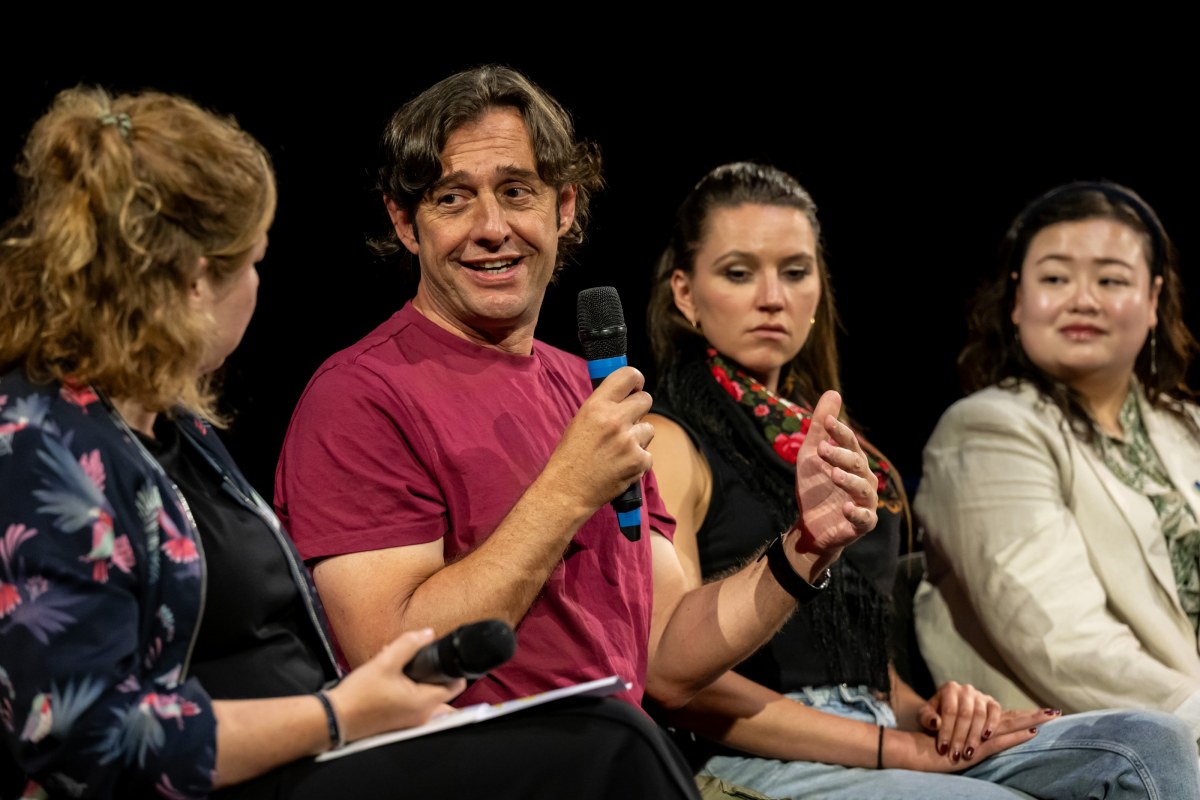
Endnotes: FRESH STREET #5 took place at the Hippodrome in Great Yarmouth, 28 to 30 May 2025.
It was co-organised by Circostrada Network and Out There Arts in the frame of Out There Festival, and in partnership with Outdoor Arts UK. FRESH STREET #5 was the springboard for a three-year international and UK reciprocal exchange network programme: a collaborative and creative opportunity to revitalise the exchange of world-class, tour-able, quality outdoor work and innovate the outdoor arts as an effective means to engage with communities. Circostrada is the European Network for contemporary circus and outdoor arts. Created in 2003 with the core mission of furthering the development, empowerment and recognition of these fields at European and international levels, over the years the network has become an important anchoring point for its members – 170 organisations from over 45 countries – and a key interlocutor in the dialogue with cultural policymakers across Europe.
www.circostrada.org
Out There Arts produce the annual Out There International Festival of Outdoor Arts & Circus – now in its 17th year and one of the three largest free Outdoor Arts festivals in the UK, with 30-50+ artistic companies and audiences of 60,000+. Out There Arts – National Centre for Outdoor Arts & Circus is a registered charity and Arts Council England funded National Portfolio Organisation. www.outtherearts.org.uk
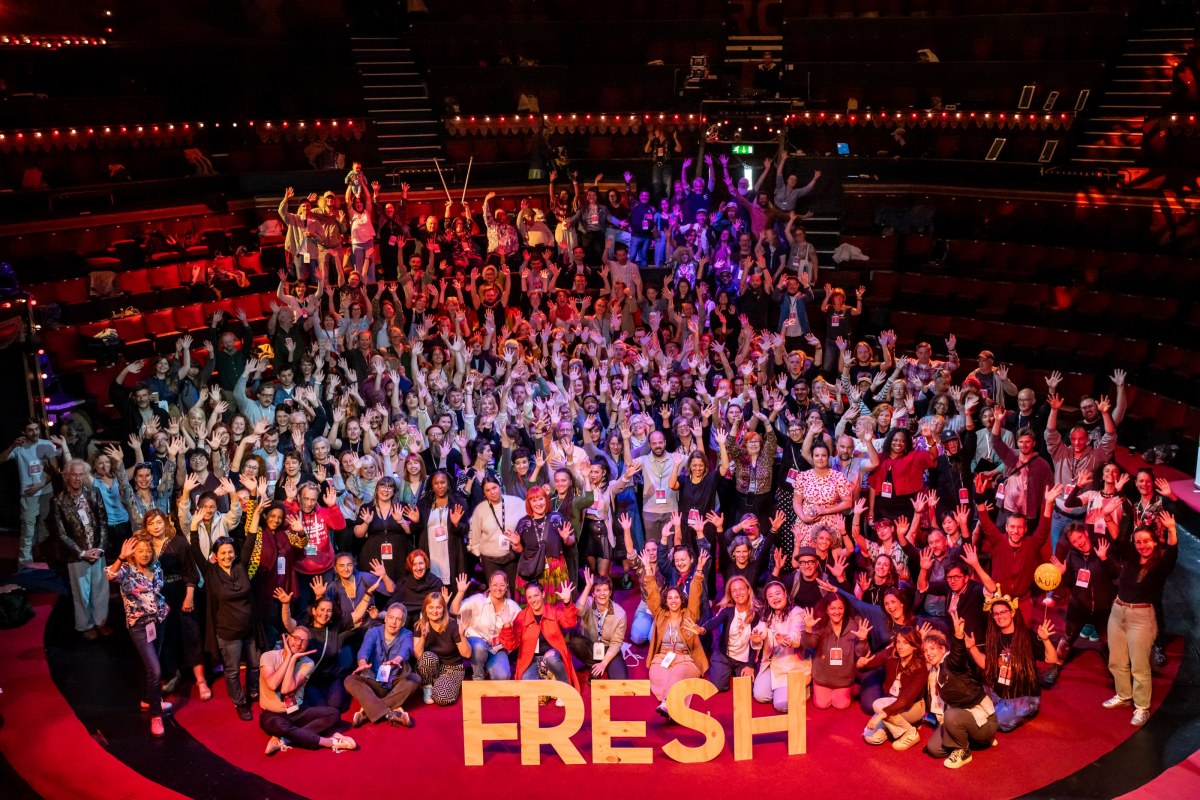
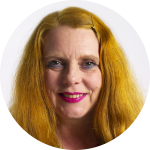
Dorothy Max Prior is a writer, artist and editor. As an artist she creates site-specific performance and installation works. She is editor of Total Theatre Magazine, and writes for and edits other arts publications. Her latest book, “Sex Is No Emergency”, is published by Strange Attractor Press (2025).



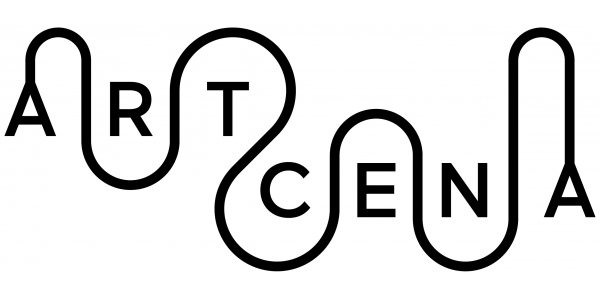

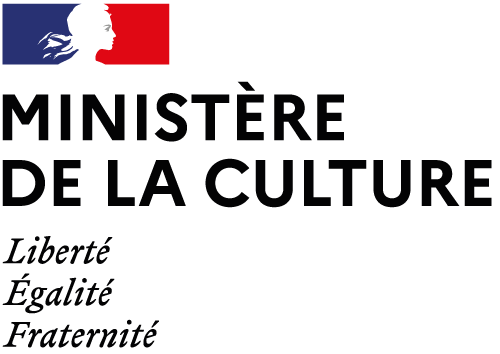
écrivez-nous : infocircostrada@artcena.fr